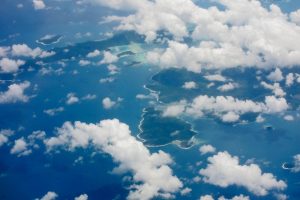Southeast Asian broadcasters were quick to trumpet the first-ever Association of Southeast Asian Nations (ASEAN) military exercise to be held in the South China Sea later this year. According to Indonesia’s military chief, Adm. Yudo Margono, the drills will not include combat training but were aimed at “ASEAN centrality.”
It’s quite the big deal, and with Indonesia as this year’s chair of ASEAN, the announcement was quickly seen as a rare show of unity on the southern edge of the South China Sea, where Beijing has staked another claim in international waters.
“In the near future, we will hold joint military drills in the North Natuna Sea, to be called the ASEAN Solidity Exercise (ENatuna) or Asec01N,” Margono told the state-run Antara news agency, after the ASEAN Chief of Defense Forces Meeting in Bali.
Margono went on to say the exercise had been agreed to by 11 military chiefs of ASEAN – including Timor-Leste – and scheduled for September this year.
The North Natuna Sea was also a choice area of operations. About a decade ago Indonesian generals were deeply upset when their Chinese counterparts confirmed Beijing’s “nine-dash line” claim did, in fact, travel south of Natuna island and deep inside Indonesia’s sovereign waters.
Four years later Jakarta renamed that southern edge of the South China Sea, encompassing the islands, as the North Natuna Sea. In Hanoi, the South China Sea is known as the East Sea and in Manila, the Philippines’ portion of the waterway was also renamed the West Philippine Sea.
“ASEAN centrality” has emerged as the latest buzzword among the 10 nation-bloc with strategic partners in the West increasingly fed-up with widening divisions between mainland and maritime Southeast Asia over issues ranging from Myanmar to Ukraine and Chinese expansionism.
In Beijing, such talk is an anathema. In Bali, Hanoi, and Manila were critical of Chinese maritime, naval or otherwise, deployments into the long-disputed waters, through which $3.5 trillion of ship-borne trade travels each year. Such talk also underpinned “ASEAN centrality.”
But not so fast, Phnom Penh appeared to say, as the military drills continued to make headlines.
A dispatch from the Cambodian government’s mouthpiece Fresh News seemed to quite publicly contradict Margono, saying the joint statement issued after the meet “does not indicate ASEAN joint military drills in the South China Sea.”
It said the commander of the Indonesian National Armed Forces had outlined “the idea for joint military drills” and had sought the advice of “nine ASEAN military chiefs.” However, there was “no response,” it added.
It said Indonesia had again asked for the opinion of the commander-in-chief of the Royal Cambodian Armed Forces (RCAF) and in this regard it said “we will assign a working group to study the joint military drills.”
“After the study is done, the Commander-in-Chief of the RCAF will request a decision from the Ministry of National Defense of Cambodia,” it stated.
Clarity on the differing statements would obviously be appreciated but clearly, Cambodia has distanced itself from any ASEAN military drill in the South China Sea and yet again Phnom Penh risks being accused of siding with China against the broader interests of the bloc.
Cambodia has been riding high since serving as last year’s chair of ASEAN and the successful staging of the Southeast Asian Games last month.
Its spot on the ASEAN totem pole has also been elevated by Myanmar’s descent into civil war, an economic collapse in Laos, and the pending admittance of impoverished Timor-Leste.
But its economy is struggling and remains fundamentally tied to Chinese investors who vacated this country as the COVID-19 pandemic took hold and have not returned.
A crackdown on political opposition ahead of next month’s elections and Chinese upgrades of the Ream Naval Base on its southern coast – viewed by Washington as China’s second foreign naval base after Djibouti – have further alienated Phnom Penh from Western governments.
In short, Cambodia’s influence is wanting and, on appearances, challenged.

































